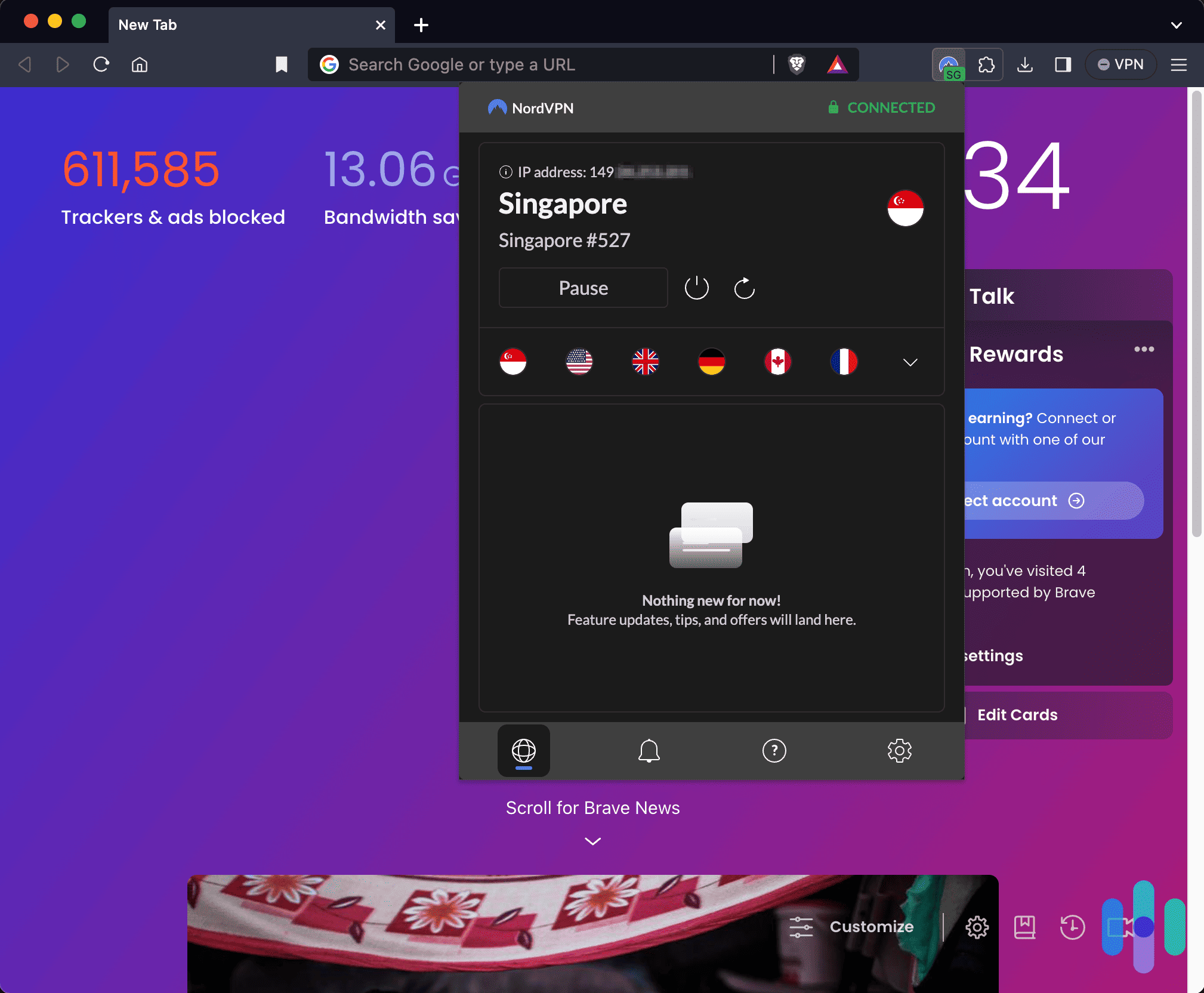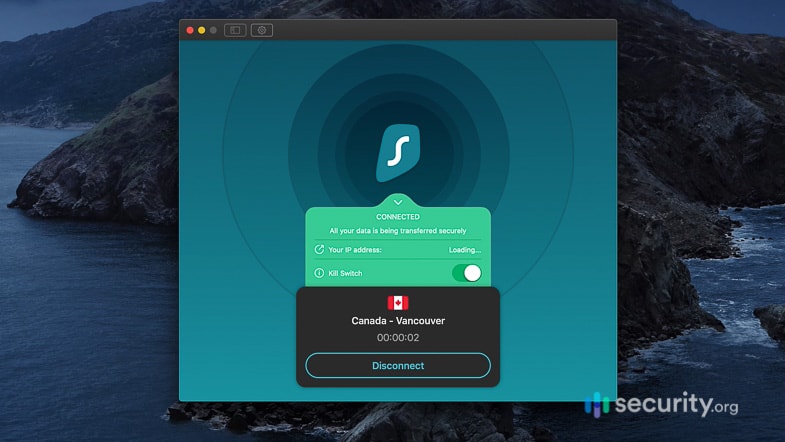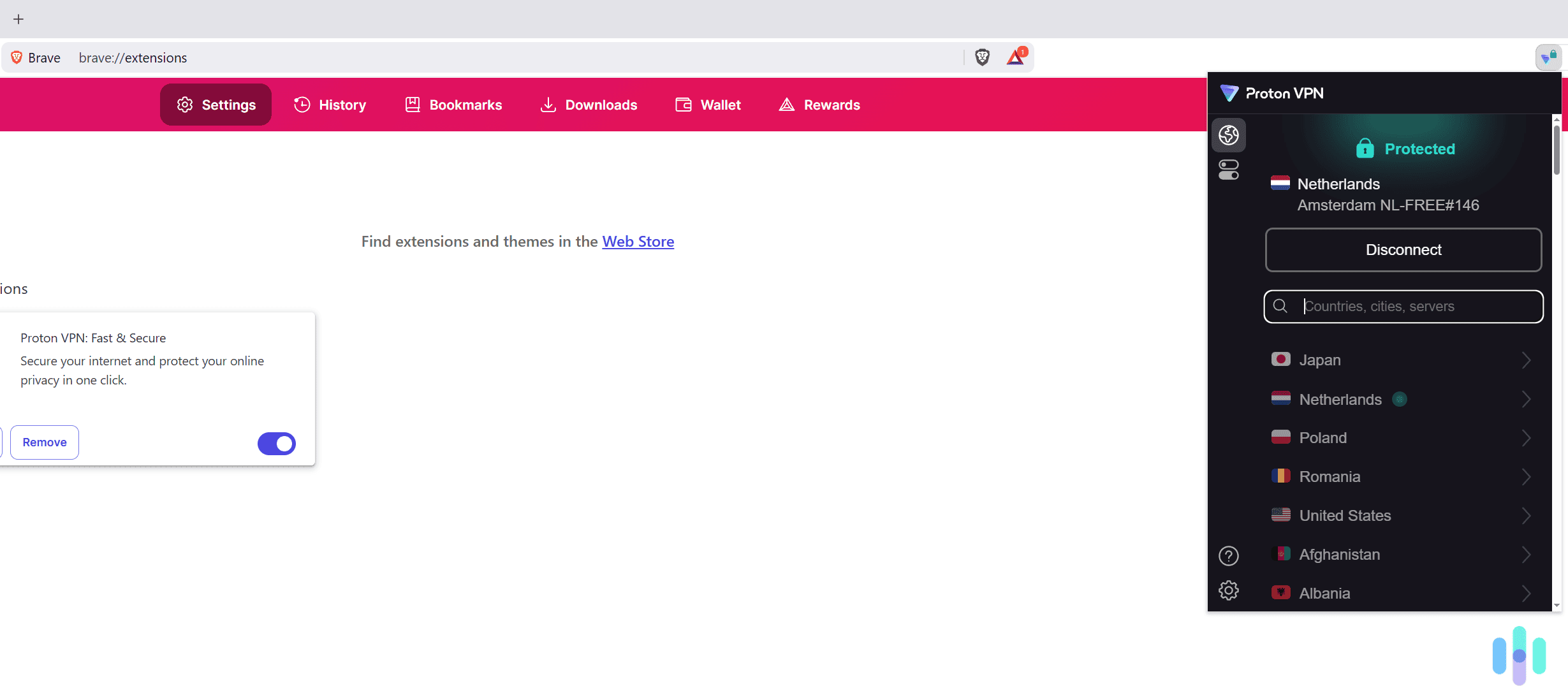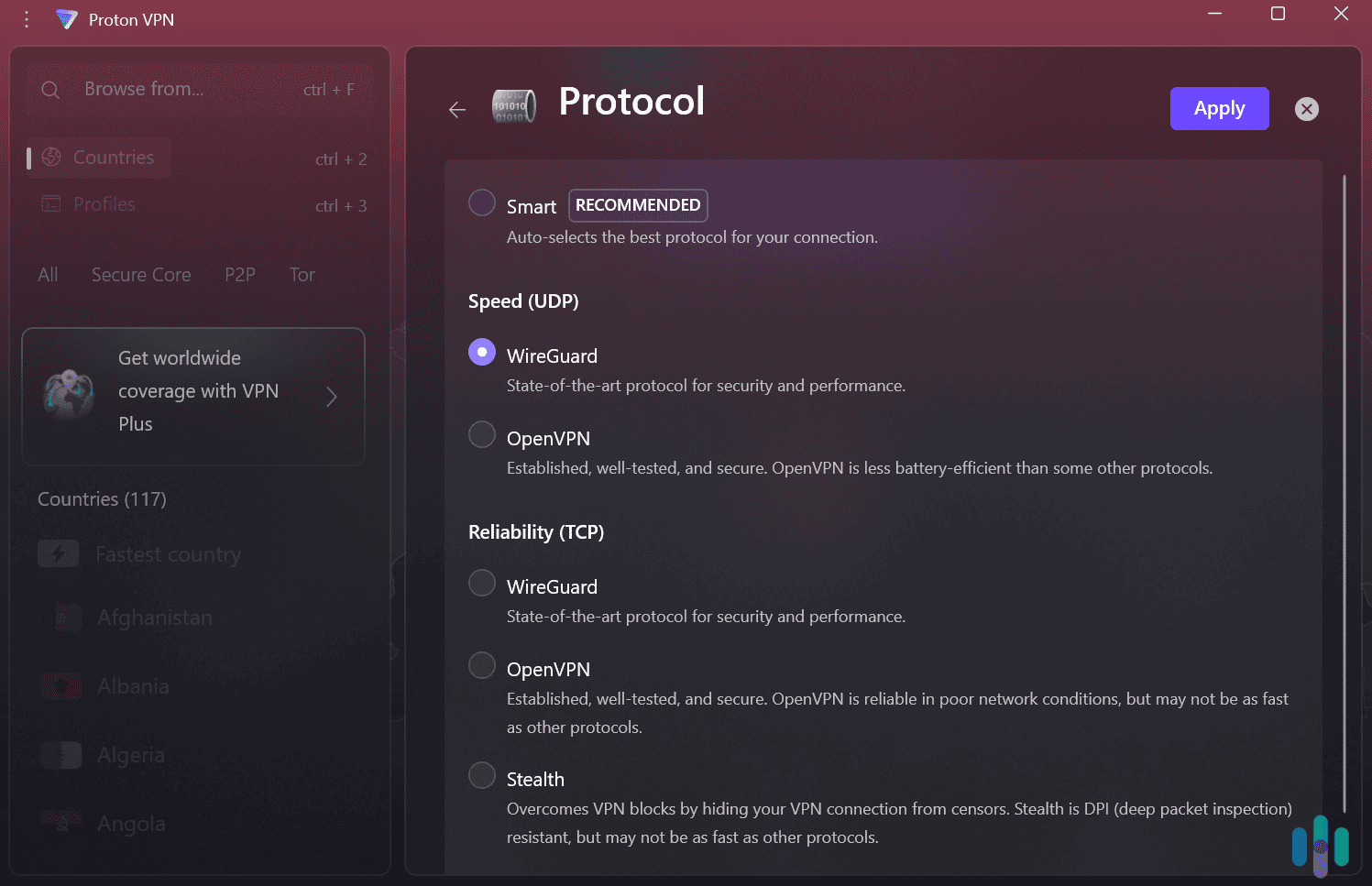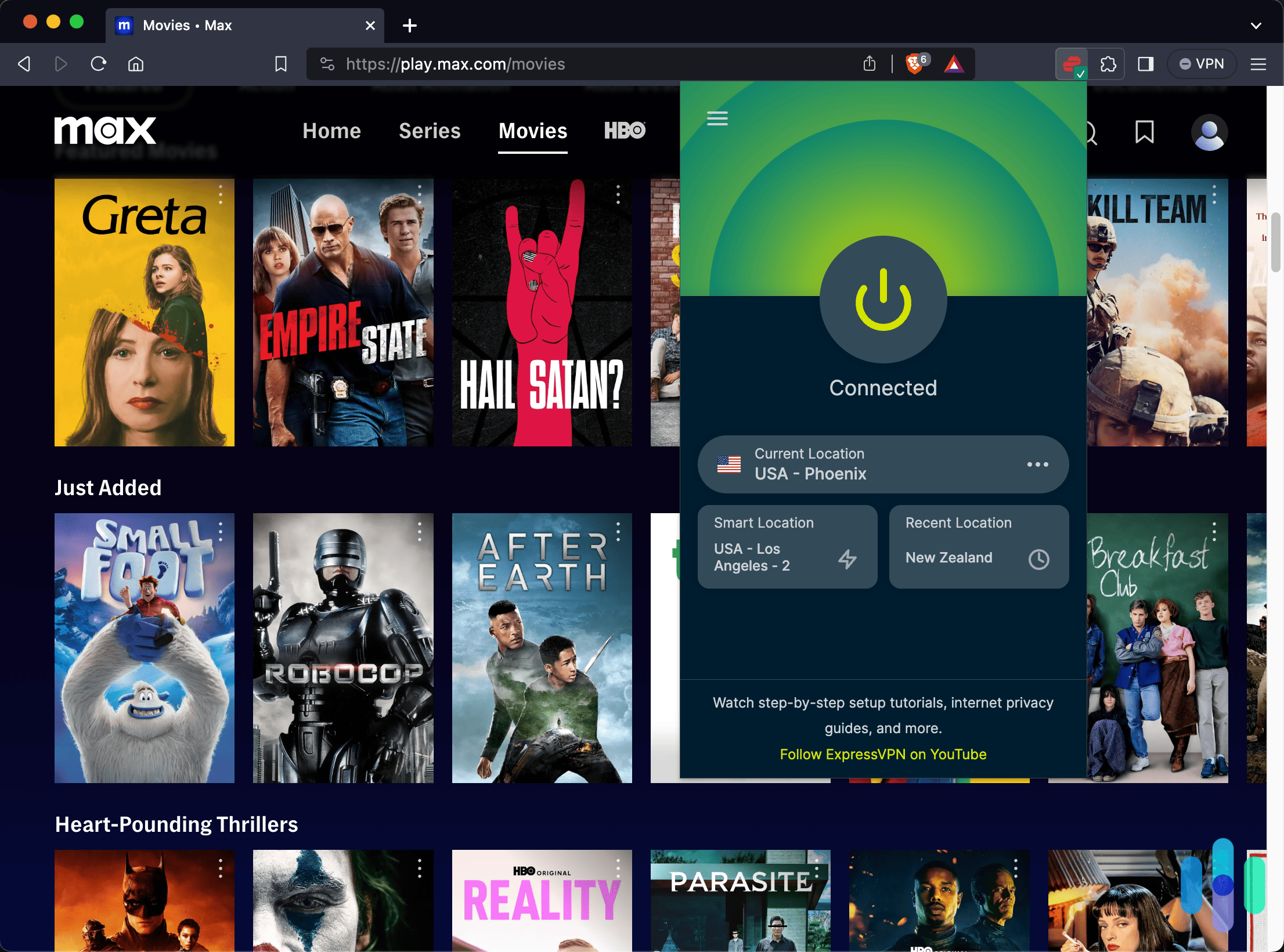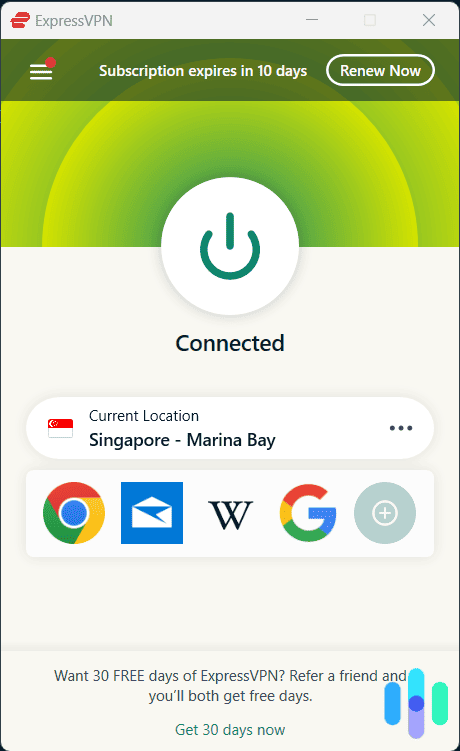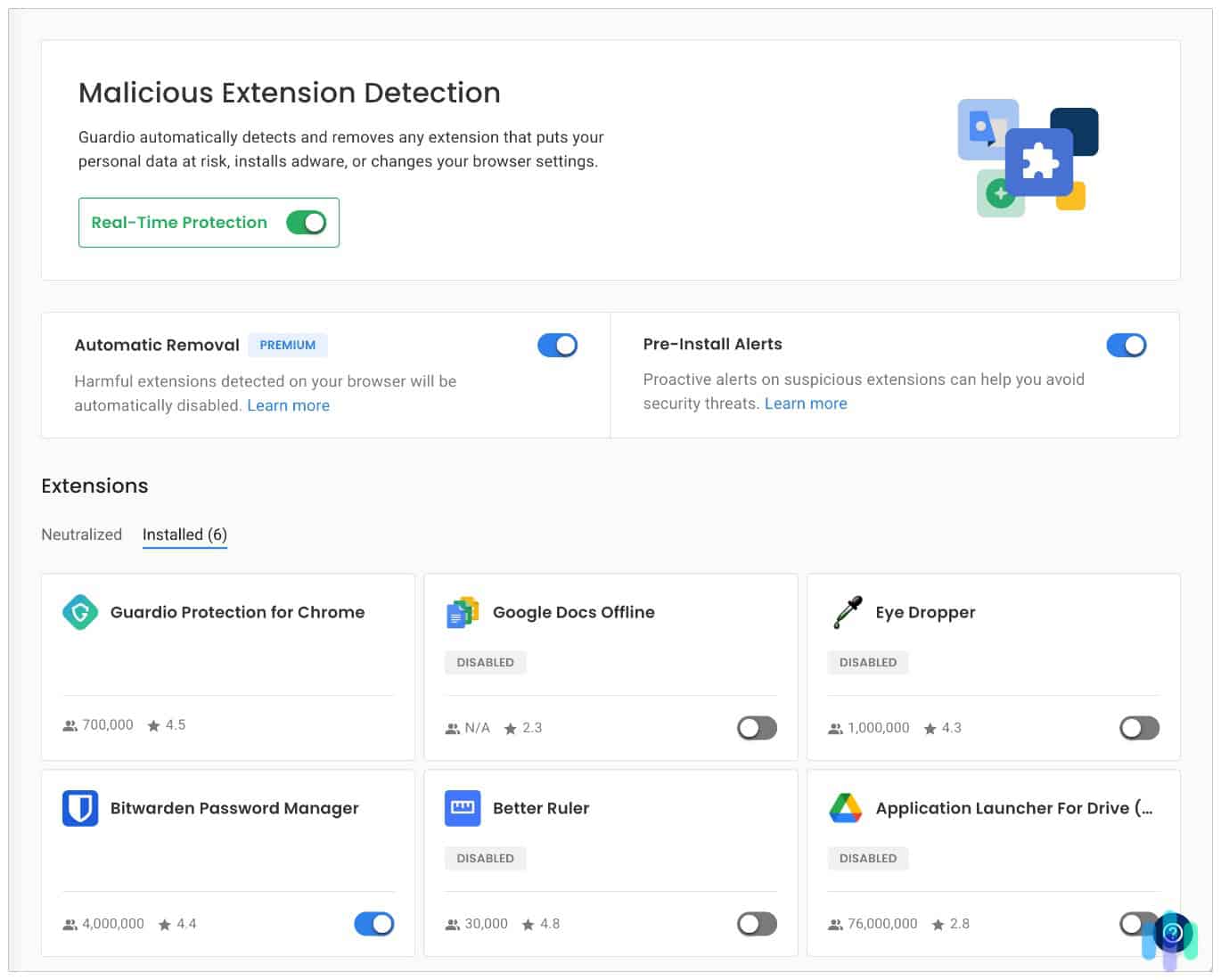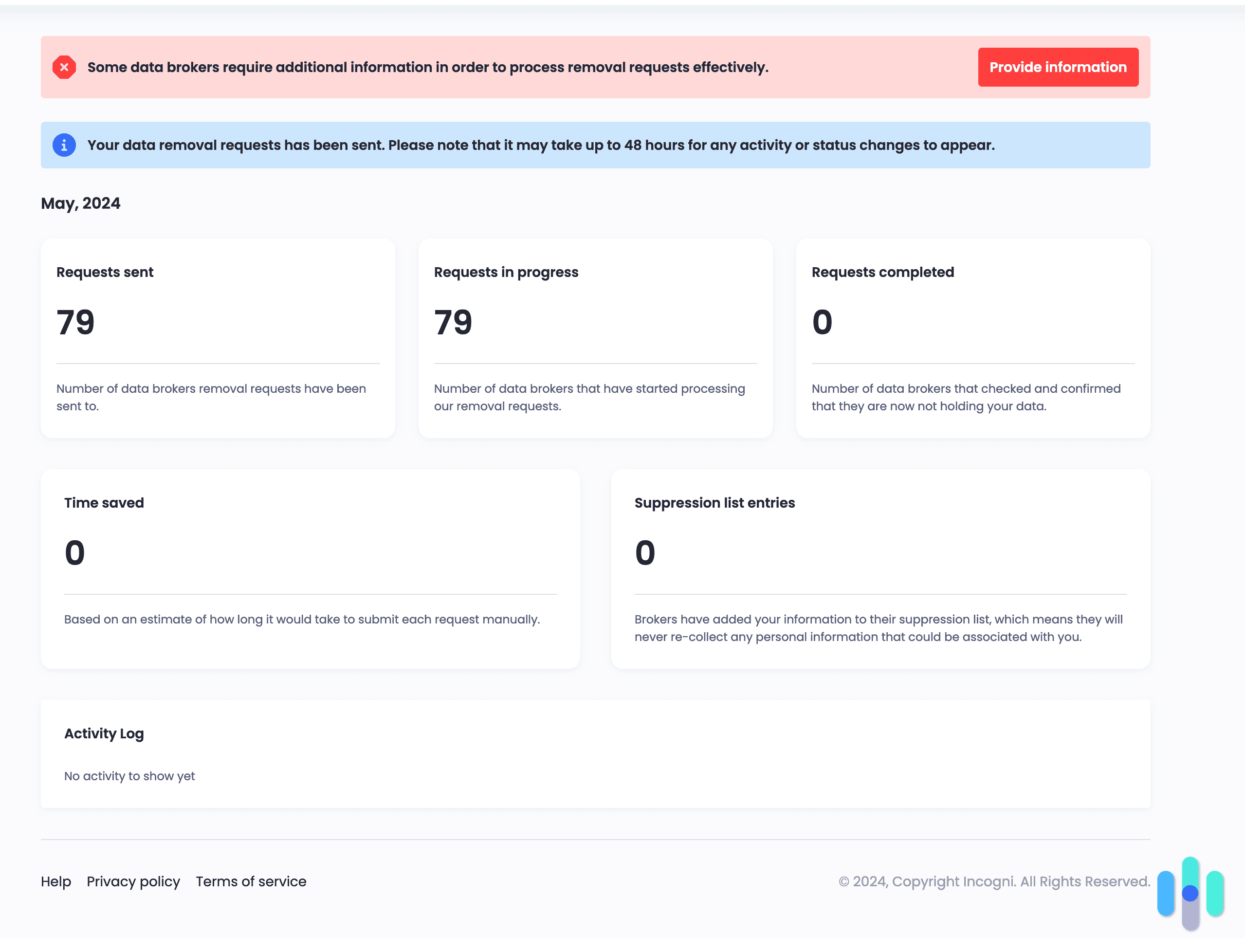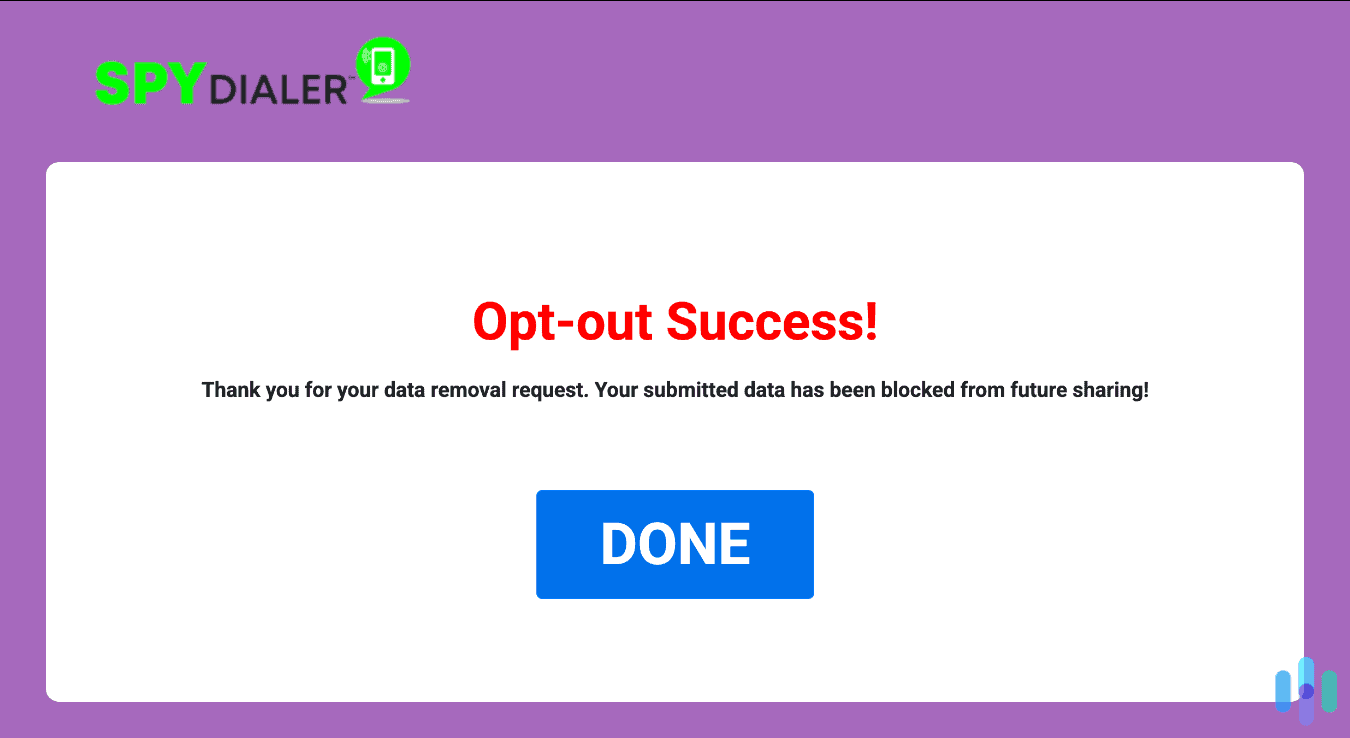Best VPNs to Use With Brave Browser in 2025
With its native browser extension, proprietary protocol for fast speeds, and enhanced privacy features are why we picked NordVPN for the top Brave Browser.

- Enhances Brave’s privacy features by concealing your actual IP address behind an anonymous address
- Proprietary protocol, NordLynx, offers fast speeds for Brave
- Offers a browser extension especially designed for use with Brave
- Enhances Brave’s privacy features by concealing your actual IP address behind an anonymous address
- Proprietary protocol, NordLynx, offers fast speeds for Brave
- Offers a browser extension especially designed for use with Brave

- Offers a browser extension especially designed for use with Brave
- Cleanweb features offers additional ad blockers
- Split-tunneling built into the Brave extension lets you connect to the VPN at the same time you’re using the regular internet
- Offers a browser extension especially designed for use with Brave
- Cleanweb features offers additional ad blockers
- Split-tunneling built into the Brave extension lets you connect to the VPN at the same time you’re using the regular internet
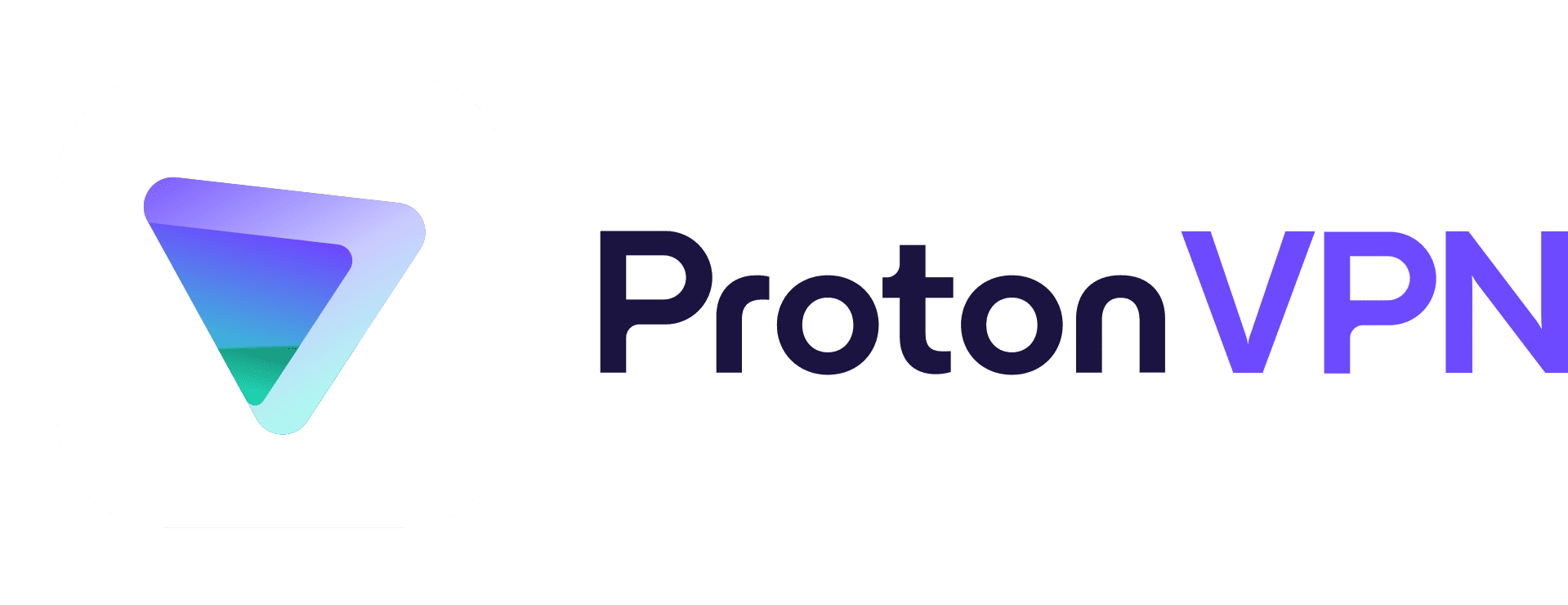
- Has an excellent free plan that offers unlimited bandwidth and strong privacy
- Free users get access to a user-friendly Brave extension
- Maintains very fast speeds for all online activities
- Has an excellent free plan that offers unlimited bandwidth and strong privacy
- Free users get access to a user-friendly Brave extension
- Maintains very fast speeds for all online activities
Brave is a free, open-source web browser that’s based on Chromium, an open-source version of Chrome. It’s largely considered one of the best private browsers since it automatically blocks as many ads and trackers as it can. That way, it can protect some of your personally identifiable information from leaking due to an exploited tracker. But, that doesn’t mean it gives you the same protections as a virtual private network (VPN). Even Chrome Incognito mode is not a VPN.
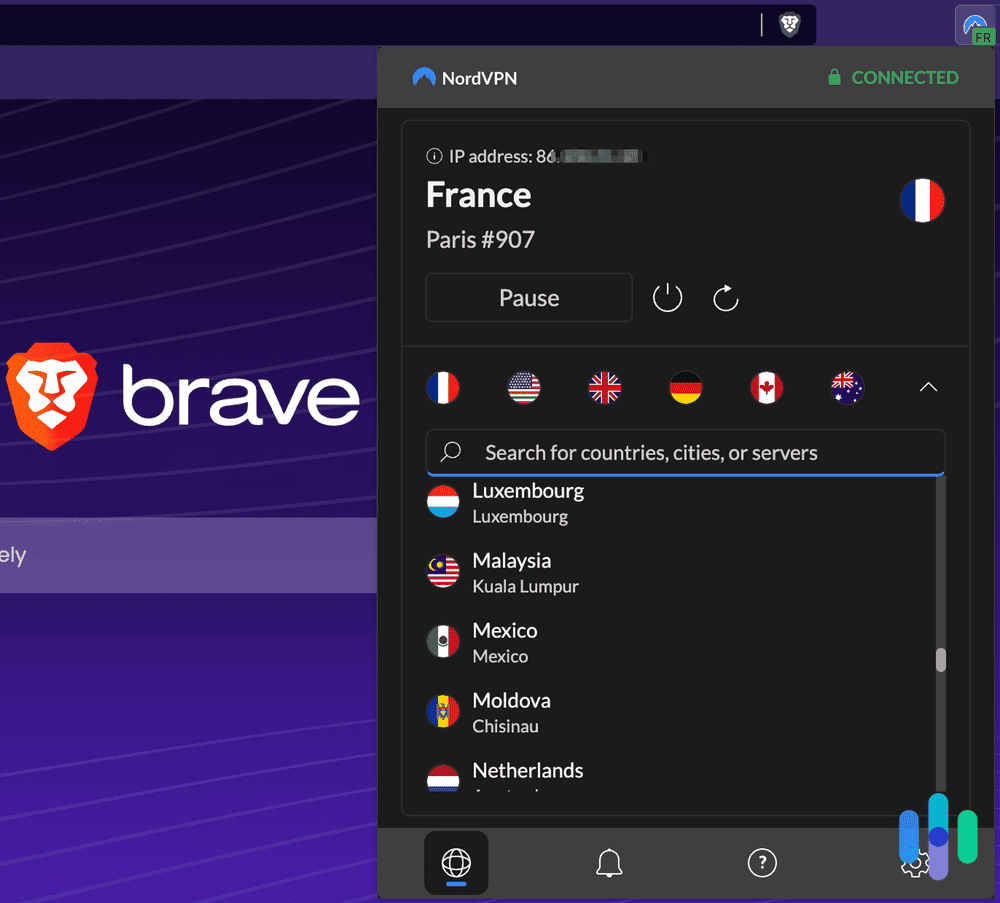
To stay safe online and keep your IP address protected, you should really use a VPN even if you already use the Brave Browser. Bad actors can do a lot with just your IP address like launching full-scale DDoS attacks that will overwhelm your network preventing you from using the internet.
The best VPNs give you full anonymity while you’re connected to the internet. Not every VPN works with Brave Browser though. Some specialize in more popular browsers like Chrome or Firefox. And even though the Brave Browser has a built-in VPN extension, an actual VPN gives you a lot more protection. So, I tested dozens of VPNs on the Brave Browser to figure out which ones work best.
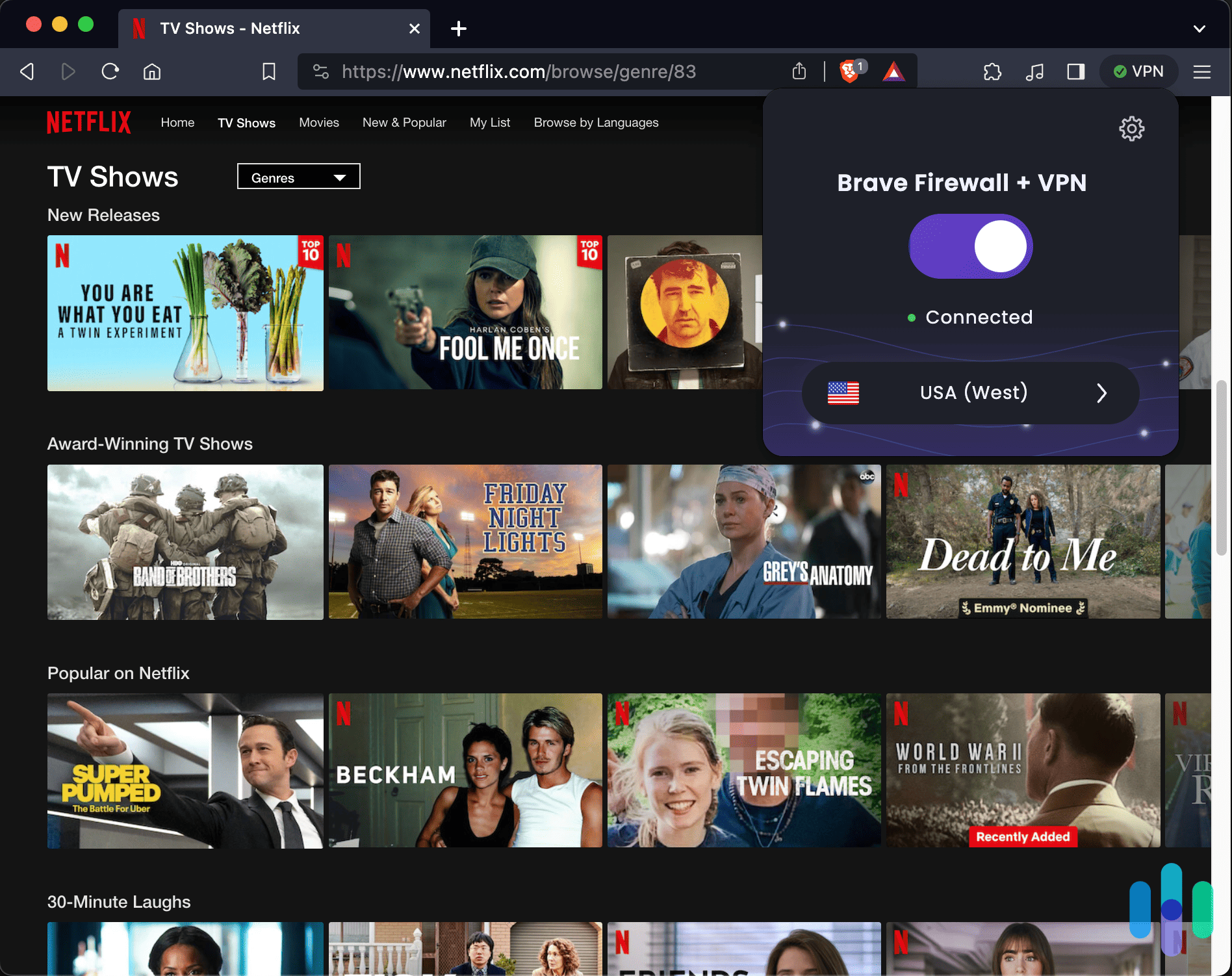
I’ve spent years putting VPNs to the test, and I’ve seen the best and worst of the services. Using those experiences, I’ve developed a list of the four best VPNs for the Brave browser. Before we get into the details of the services, though, let’s talk about how I selected them.
Criteria for Selecting a Brave VPN
| Brave Extension | I’ll go into more detail below the list of my favorite Brave VPNs, but an extension isn’t the same as a VPN. It’s a proxy that masks your IP address. It’s good to have and it adds a layer of protection — and it’s something all four VPNs on my list offer — but you shouldn’t rely on it alone. |
|---|---|
| Security | You want a VPN with strong encryptions (I recommend AES-256) that uses modern VPN protocols and has a reputable, verifiable privacy policy. Lucky for you, I’ve done the homework for you. |
| Performance | Using a VPN will lower your connection speeds a bit, but the extent to which the slowdowns occur is a function of many factors. You want a VPN with a large enough footprint that its servers won’t be overloaded, and one that uses modern networking technology to keep your speeds zippy. |
| Features | Speed and security are the two biggest factors to consider when selecting a VPN, but there are a ton on the market that are plenty fast and protective. To differentiate themselves, many offer advanced security tools such as multihop and server obfuscation, or they optimize their networks for activities like streaming and torrenting. Consider how you’ll use your VPN before you make your final selection. |
| Price | You obviously don’t want to pay too much for a VPN. Most VPNs cost between $3 and $15 per month, depending on the features and provider you choose and the duration of your subscription. The longer you sign up for, the cheaper it’ll be in the long run. |
Now that you have a pretty good idea of what to look for and the lens through which I’m looking at these services, let’s get to the list of the best VPNs for the Brave browser.
List of the Best VPNs for the Brave Browser
- NordVPN - Best VPN for privacy on Brave
- Surfshark - Most affordable Brave VPN
- Proton VPN - Best Free VPN for Brave
- ExpressVPN - Best user-friendly VPN on Brave
The Best Brave Browser VPNs Compared
| System |
NordVPN

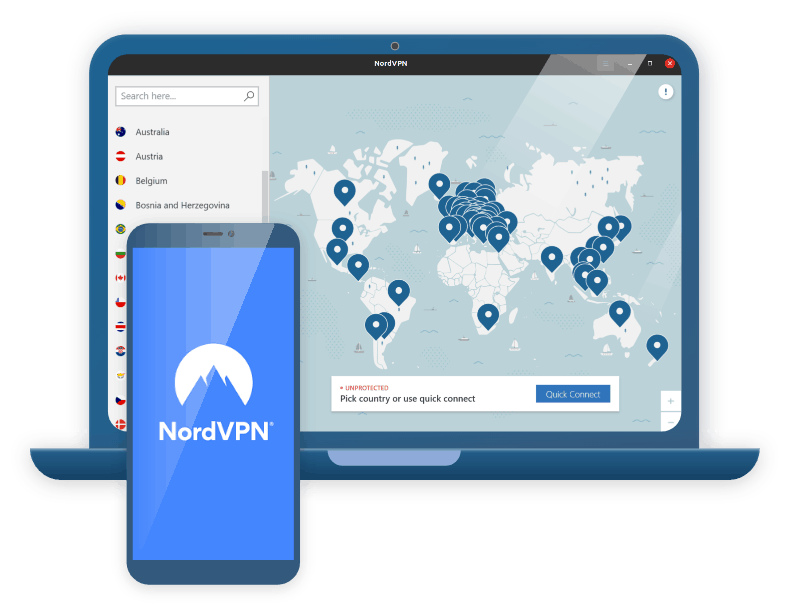
|
Surfshark


|
Proton VPN

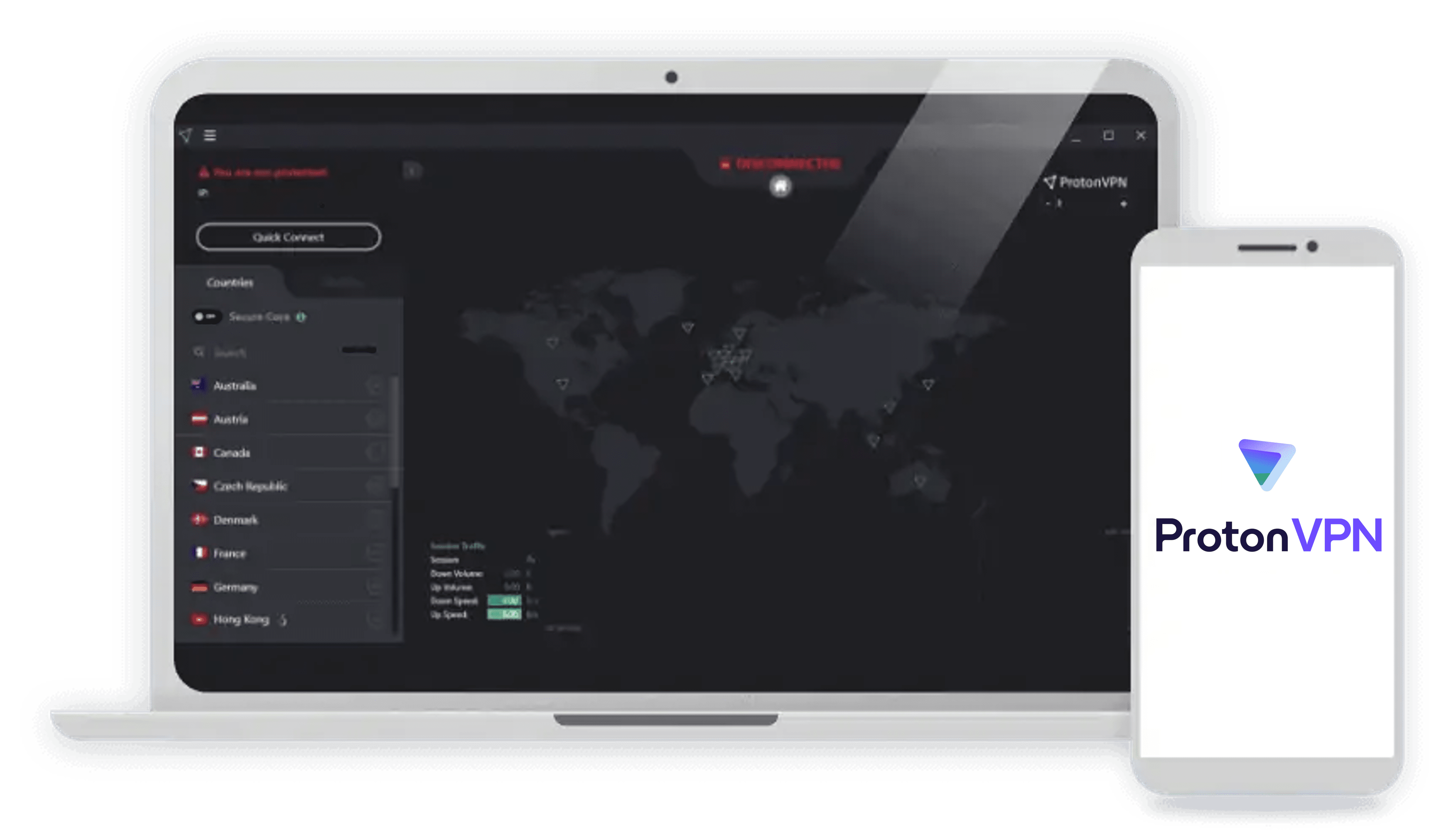
|
ExpressVPN

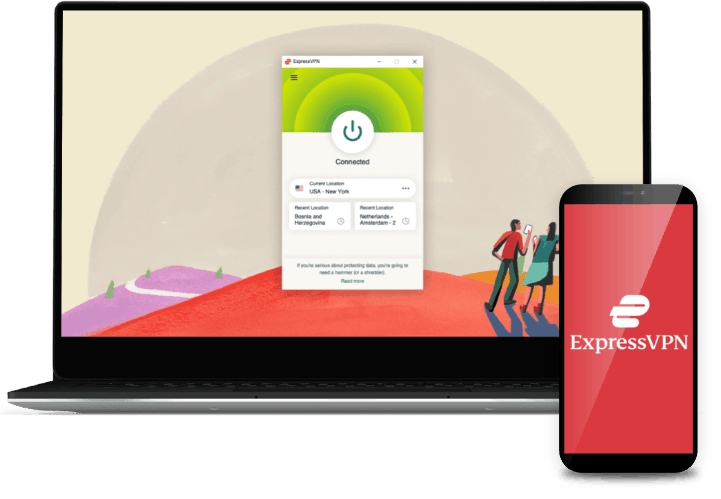
|
|---|---|---|---|---|
| Ranking | 1st | 2nd | 3rd | 4th |
| Ratings | 9.7/10 | 9.5/10 | 9.3/10 | 9.1/10 |
| Monthly subscription costs | $3.99-$12.99 | $2.49-$15.45 | $4.49-$12.99 | $8.32-$12.95 |
| Subscription lengths | 1 month, 1 year, or 2 years | 1 month, 1 year, or 2 years | 1 month, 1 year, or 2 years | 1 month, 6 months, or 1 year |
| Encryption type | AES-256-GCM | AES-256-GCM | AES-256 | AES-256 |
| VPN protocols | OpenVPN, NordLynx | WireGuard, OpenVPN, IKEv2 | WireGuard, OpenVPN, Stealth | Lightway, OpenVPN, IKEv2 |
| Kill switch | Yes | Yes | Yes | Yes |
| Split tunneling | Windows and Androids only | Windows, Androids, and routers only | Windows, Android, Android TV, browser extensions | Windows and Androids only |
| Netflix access | Yes | Yes | Yes | Yes |
| IP Addresses | Dynamic and Static | Dynamic and static | Dynamic | Dynamic |
| Brave browser extension | Yes | Yes | Yes | Yes |
| Read Review | NordVPN Review | Surfshark Review | Proton VPN Review | ExpressVPN Review |
-
1. NordVPN - Best VPN for Privacy on Brave
 View Plans Links to NordVPN
View Plans Links to NordVPNProduct Specs
Multihop Yes Obfuscated Servers Yes Kill Switch Yes Split Tunneling Yes Netflix Yes Torrenting Yes 
NordVPN Overview
NordVPN is one of the best VPNs on the market. It does an excellent job of balancing security and speed, and its cutting-edge fleet of RAM-only servers is the gold standard in privacy protection (more on that in just a bit). If you’re looking for an all-around secure VPN for Brave, NordVPN is likely your best bet.
Using the NordVPN extension with Brave Browser What We Like
- Shared IP addresses
- Multihop technology
- Five Eyes, Nine Eyes, 14 Eyes nonmember
- Strict logging policy
- Brave extension available
What We Don’t Like
- Only six simultaneous connections
- Limited torrenting support
- Kill switch isn’t available for all apps
- Relatively slow on Windows devices
Performance
NordVPN has a fleet of about 6,000 servers in 111 countries across the globe. That’s great news for folks who love to travel, since it means you’ll always be in close physical proximity to one of the company’s server locations. Your speeds — latency, in particular — are greatly influenced by your distance from the actual server.
>> Learn More: Best VPNs for Travel
Speeds are pretty important, especially if you’re doing things like streaming and torrenting that are pretty resource-hungry. Nord is my go-to VPN both at home and abroad, and I appreciate it for its high speeds and ability to unlock Netflix libraries from all over the globe. It’s able to do that through a process called server obfuscation, which makes it so Netflix’s VPN blockers can’t tell your data is any different from regular traffic, allowing you to connect undetected. I was just recently using NordVPN to watch Japanese game shows with my partner from our apartment in Brooklyn. Isn’t the future awesome?
>> Also See: Top VPNs for Streaming
Trash TV aside, how fast is NordVPN? Very fast. The data below was taken from my most recent test of NordVPN’s speeds.
NordVPN Speed Test
Testing computer MacBook Pro Acer Aspire 5 Ping without VPN (in ms) 42 5 Ping with VPN (in ms) 46 160 Ping difference 10% 3,100% MacBook download speed without VPN (in Mbps) 54.86 23.49 Download speed with VPN (in Mbps) 41.37 21.7 Download speed difference 24% 8% Upload speed without VPN (in Mbps) 33.86 24 Upload speed with VPN (in Mbps) 27.21 7.91 Upload speed difference 20% 67% A single speed test can only show how the VPN was performing at that moment, though, so you need to work with each VPN for an extended period to understand how they affect your overall performance. I have, and Nord is consistently fast and works just a little better on Mac than it does on PC. Just something to keep in mind.
>> Check Out: Best VPNs for Mac
NordVPN’s servers are super fast and offer unlimited bandwidth, but they also have an important privacy feature built in: They’re all RAM-only. RAM requires power to store data, so that means every time a server is cycled down for maintenance — which happens frequently — any data that was being stored on it is irretrievably lost. Surfshark also has RAM-only servers. But, I still like NordVPN a bit more because it regularly gets third-party audits of its security. Learn more in our NordVPN vs Surfshark comparison.
When Nord says it’s “no log,” it really means it’s no log. NordVPN tops our list of the best no-log VPNs, and I’m sure Brave users will appreciate that level of security.
Price
I have more on this in my guide to NordVPN’s prices, but the company takes a tiered approach, with three service plans and three subscription durations. Nord is not as cheap as Surfshark, but we’re talking about saving a few dollars over two years. The price difference is negligible.
NordVPN Pricing
NordVPN plan Monthly price 1-year plan 2-year plan Standard $12.99 $4.59 per month $3.69 per month Plus $13.79 $5.49 per month $4.69 per month Ultimate $14.99 $7.49 per month $6.69 per month One thing to note: If you’re just looking for a VPN, you don’t need to bother with NordVPN’s Plus or Ultimate subscriptions. They add things like password managers and cloud storage, which are helpful but not absolutely necessary.
-
2. Surfshark - Most Affordable Brave VPN
 View Plans Links to Surfshark
View Plans Links to SurfsharkProduct Specs
Multi-hop Yes Camouflage Mode Yes Kill switch Yes Split Tunneling Yes Netflix Yes Torrenting Yes 
Surfshark Overview
Surfshark is another rock-solid VPN that takes its users’ privacy very seriously. The company also offers RAM-only servers, which wipe out data as soon as they’re powered down, and its server footprint is large enough that you’ll rarely run into server-load issues. If NordVPN isn’t doing it for you, Surfshark is definitely a close second. I tested the VPN hands-on, and it impressed me with its fast speeds and split-tunneling feature.
>> Learn More: Best VPN for Safari
What We Like
- CleanWeb feature blocks ads, trackers, and malware
- Automatically blocks and rejects cookie pop-ups when browsing
- Split tunneling built into the Brave extension
- WebRTC leak blocking
What We Don’t Like
- Uses static IP addresses by default, which are easier to track
- No phone support
- Takes a bit longer to connect than other VPNs
- No option to manually select VPN protocol
Surfshark Connected Performance
As you can see from my most recent speed test below, the performance is similar to NordVPN, only mirrored. Surfshark does a little better on Windows than it does on Mac. It’s not a huge difference, but it’s somewhat noticeable over time.
>> Learn More: Best VPNs for Windows
Surfshark Speed Test
Devices tested on MacBook Pro Acer Aspire 5 (Windows 10) Ping without VPN 54 ms 7 ms Ping with VPN 53 ms 199 ms Ping difference 2% 2,742% MacBook download speed without VPN 16.21 Mbps 23.69 Mbps Download speed with VPN 11.87 Mbps 19.61 Mbps Download speed difference 31% 17% Upload speed without VPN 22.01 Mbps 24.09 Mbps Upload speed with VPN 24 Mbps 10.58 Mbps Upload speed difference 9% 56% One thing I really appreciate about Surfshark is its split-tunneling feature, which allows you to pass certain traffic through the VPN connection while leaving other traffic connected traditionally. It’s great for keeping speeds high and functionality seamless. I’ve found that my email client can get a little fussy when I’m traveling, so I always use split tunneling to connect it to a U.S.-based server. Once it thinks it’s back in Brooklyn, I have no issues at all. But, the split-tunneling feature only works on Windows and Android devices. If you need split tunneling on Apple devices, check out my review of Private Internet Access. It’s the only VPN to offer split tunneling on the current version of macOS.
Surfshark built the split-tunneling feature into its Brave browser extension as well, and I have more information on exactly what that means after the list.
>> Learn More: Understanding Split Tunneling
Price
Surfshark’s costs are a little bit lower than NordVPN’s when you look at the two-year subscription plan. I always recommend the longest term, because, in the long run, it will save you the most money. Most VPNs offer free trial periods or at least money-back guarantees so you can make sure they’re the right service for you. With Surfshark, you can get a full refund for your subscription up to 30 days after purchase.
>> Check Out: Best VPNs With Free Trials
Surfshark Prices
Surfshark plan Monthly costs 1-year plan 2-year plan Surfshark Starter $15.45 $3.22 per month $2.39 per month Surfshark One $15.95 $3.77 per month $3.06 per month Surfshark One+ $17.95 $5.99 per month $4.69 per month Similar to NordVPN, if you’re just looking for a VPN, the Starter subscription will get you exactly where you need to go. The other tiers — Surfshark One and Surfshark One+ — add tangential services such as CleanWeb, which blocks cookies, trackers, and ads, but that’s something Brave already does for you anyway.
>> See Also: Best VPN for Firefox
-
3. Proton VPN - Best Free VPN for Brave
View Plans Links to Proton VPNProduct Specs
Multi-hop Yes Camouflage Mode Yes Kill switch Yes Split Tunneling Yes Netflix Yes Torrenting Yes Proton VPN Overview
Proton VPN offers free access to a really user-friendly Brave extension. Proton VPN is the best free VPN for Brave users because its free plan offers unlimited data. It also comes with an independently-audited no-logs policy, a kill switch, fast speeds, and user-friendly apps, including a Brave extension.
>> Read More: The Best Free VPNs in 2025
What We Like
- Has a free plan with unlimited bandwidth and fast speeds
- Offers access to a Brave browser extension
- Provides high-end privacy and security features
What We Don’t Like
- Its long-term plans are pricier than its competitors
- Offers a 30-day refund, but it’s prorated
Performance
Free users enjoy very fast speeds since they can use the WireGuard protocol. Proton VPN’s free plan delivers very fast speeds, despite it limiting you to five server locations. In our week-long test, we always maintained fast browsing, streaming, and gaming speeds. Websites loaded instantly, YouTube videos didn’t buffer, and our ping was stable while playing Fornite and Roblox.
Free users can’t pick specific servers, but this isn’t an issue since Proton VPN automatically connects you to the fastest server. You can also use WireGuard, a very fast VPN protocol that’s known for excellent performance.
FYI: We regularly test the speeds of Proton VPN’s paid version. It’s currently one of the fastest VPNs we’ve tested. On average, it doesn’t slow our download and upload speeds by more than eight percent.
Price
Proton VPN has two paid tiers: “VPN Plus” and “Proton Unlimited.” “VPN Plus” adds extra VPN features, like servers in 117 countries, streaming and P2P support, and ad-blocking. “Proton Unlimited” adds extra security services, like ProtonMail and Proton Pass.
We think the “VPN Plus” tier is enough for most users. Here’s a breakdown of its pricing:
Proton “VPN Plus” Pricing 1-Month Plan $9.99/month 1-Year Plan $4.99/month 2-Year Plan $4.49/month All paid plans come with a 30-day money-back guarantee, but it’s prorated. This means you’ll only be refunded the unused portion of your subscription. In contrast, other competitors offer full refunds, like NordVPN and Surfshark.
>> Further Reading: How Much Does Proton VPN Cost in 2025?
-
4. ExpressVPN
 View Plans Links to ExpressVPN
View Plans Links to ExpressVPNProduct Specs
Multihop No Obfuscated Servers Yes Kill Switch Yes Split Tunneling Yes Netflix Yes Torrenting Yes 
ExpressVPN Overview
Another well-known name in the VPN world, ExpressVPN boasts a large fleet of RAM-only servers spread across the globe, which means high speeds and low latency. It also offers advanced security features that make it easy to stream and torrent on its network and an air-tight no-log policy that will please even the most ardent privacy purists.
Testing the ExpressVPN Brave Browser extension on Max >> Lean More: Best VPNs for Torrenting
What We Like
- Over 2,000 servers in 105 countries
- Ability to torrent
- Split tunneling
- Outside Five Eyes, Nine Eyes, and 14 Eyes territories
- Brave extension available
What We Don’t Like
- No customer support available via phone
- On the pricier side
- Can connect only five devices at the same time
- Slower on Macs
Performance
ExpressVPN isn’t the fastest VPN I’ve ever tested, but it’s solidly in the middle of the pack. If you’re using a high-speed internet connection, you’re not likely to notice any significant slowdowns in your day-to-day browsing. I have noticed some buffering issues at times when I use ExpressVPN to stream movies, but it’s not often enough to be a major problem.
Mac Download Speeds
Without VPN 37.05 mbps With VPN 22.7 mbps Windows Download Speeds
Without VPN 62.88 mbps With VPN 39.77 mbps Mac Upload Speeds
Without VPN 25.9 mbps With VPN 22.19 mbps Windows Upload Speeds
Without VPN 14 mbps With VPN 20 mbps Express VPN is pretty well balanced between Mac and PC, so I can’t say it works better on either. I will say, though, that it’s really easy to use. That’s why I’ve included it on this list.
ExpressVPN Windows app interface >> Learn More: Best VPNs for Chrome
When you start talking about network protocols and ping times, a lot of people’s eyes glaze over. I can’t blame them; unless you geek out on digital security like me, this stuff can be pretty uninteresting.
Price
I wish I could say ExpressVPN is cheap, but it’s actually one of the more expensive VPNs on the market. We’re talking about a difference of maybe $25 over the course of a year, but still, that adds up. I wouldn’t say it’s too expensive for what you’re getting, but I will say ExpressVPN’s costs are a bit steep.
ExpressVPN Pricing
Subscription duration 1 month 6 months 1 year Monthly price $12.95 $9.99 $8.32 ExpressVPN’s prices aren’t outrageous, but if you’re looking for something a little more budget-friendly, I’d suggest checking out my guide to the best affordable VPNs.
Do I Need a VPN If I Use Brave?
Brave is billed as a very privacy-forward browser, but it does not automatically encrypt the data passing through it. For that, you’ll need to use a reputable VPN like the ones detailed above.
Why? Because anyone who is technologically skilled and so inclined can intercept your internet traffic, and, with a bit of elbow grease, use it to figure out a lot about you, including your physical location, the device you’re using, where you’ve been going online, and what you’ve been doing. That includes your ISP, which will take all that data and sell it to advertisers or law enforcement and intelligence agencies, who are doing who-knows-what.
I, for one, don’t want to find out.
That’s not to mention the hackers and scammers who are trolling for personally identifying information, mostly through man-in-the-middle attacks where they intercept the data going between two entities. To prevent all of that, you need a VPN.
VPNs encrypt your data as it moves from one point to another, meaning anyone who wants to snoop or scoop it up will have an extremely difficult — if not impossible — time deciphering it. Great for privacy, great for protection, great for poking big brother right in that all-seeing eye.
Does Brave Have a Built-In VPN?
The Brave browser does not have a built-in VPN extension, but it did release a stand-alone service in 2016. It costs $9.99 a month or $99.99 per year, and you can protect up to five devices on one subscription. With just 17 server locations, the Brave VPN has very limited access. The list of regions you can connect through includes:
- Australia
- Brazil
- Canada
- France
- Germany
- Italy
- Japan
- Netherlands
- Singapore
- Spain
- Switzerland
- U.S. (Central)
- U.S. (East)
- U.S. (Northwest)
- U.S. (West)
- United Kingdom
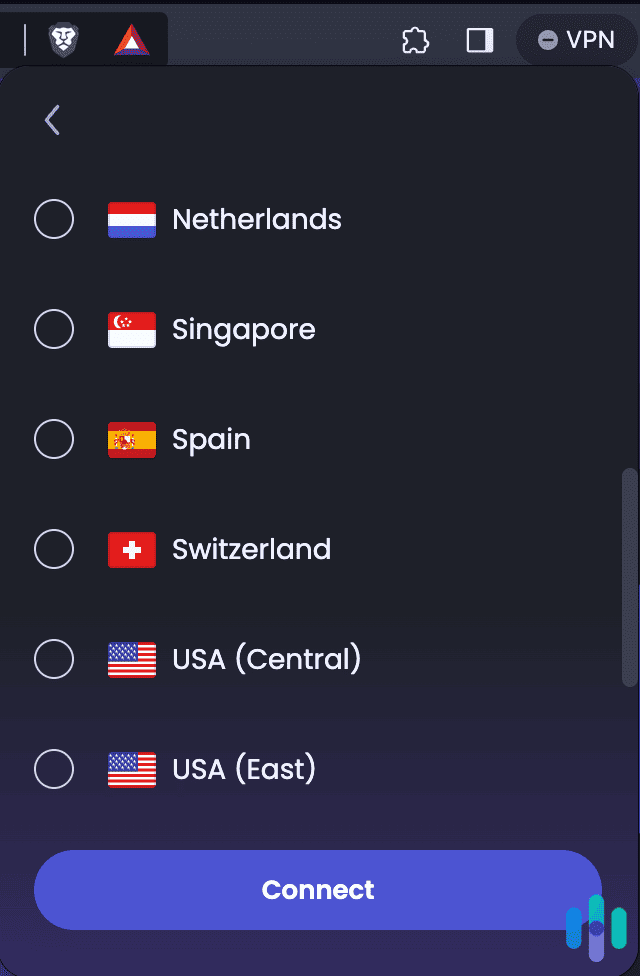
As far as VPNs go, though, it’s a little bare-bones. It doesn’t offer the advanced features or extra security of any of the VPNs on this list. For $9.99 per month, you can definitely subscribe to something a little more robust.
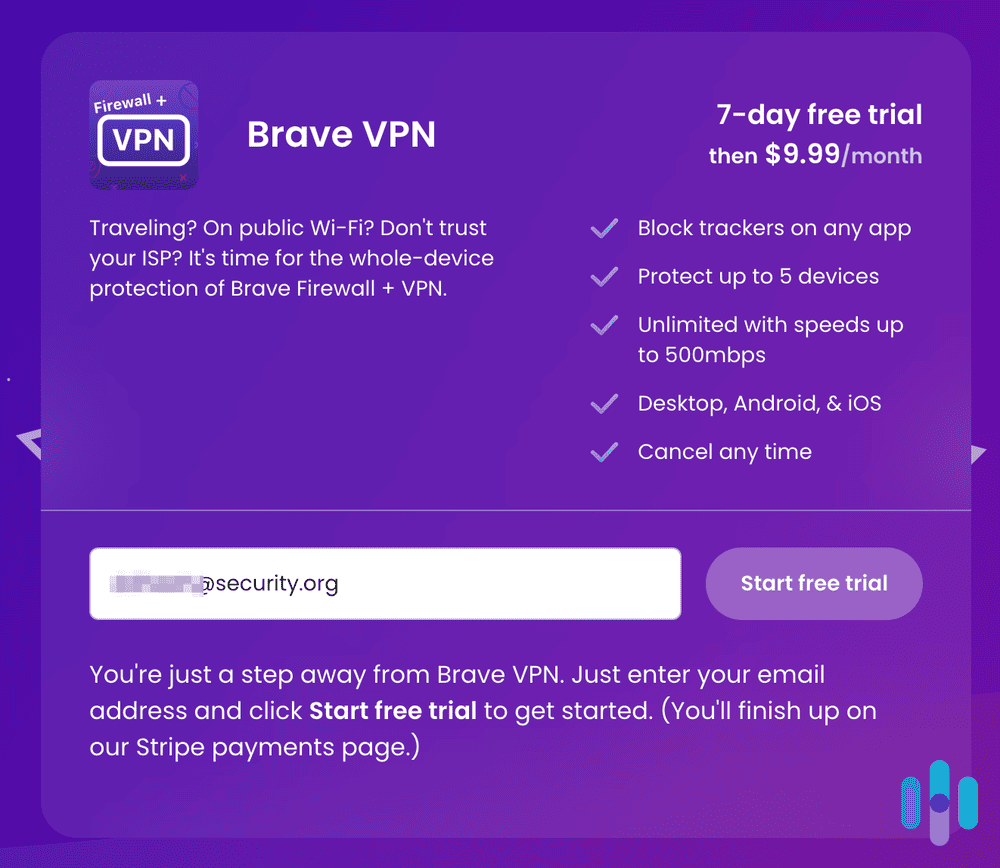
Is a Brave VPN Extension Enough Protection?
A resounding no. A lot of VPN companies claim to have VPN browser extensions, which I take a bit of offense to. Why? Because it’s misleading. There are no browser-level VPNs — just proxies. The difference is that a VPN will hide your IP address and encrypt your traffic, but a proxy will just make it more difficult to tell what your original IP address is.
I’m not knocking proxies. They’re a decent security measure and will help prevent people from pinpointing your physical location, knowing the devices you’re using and the browser you’re connecting with, but they won’t do anything to protect you from man-in-the-middle attacks and they aren’t going to prevent ISPs and government agencies from figuring out exactly what you’re doing online. For that, you’ll need a full-blown VPN app.
Methodology
We take testing VPNs very seriously, so we want you to know exactly how we do it. Our methodology is a combination of looking at features such as encryption standards, the VPN’s logging policy, its customer service, and other factors to confirm the service does everything a VPN should do.
We then put each product through performance and security tests to make sure the trade-off between safety and speed is worth it and that nothing slips through the cracks data-wise. We’ll define exactly what that looks like below.
Security
Security is one of the biggest reasons to use a VPN in the first place, so it’s non-negotiable that we feel safe when using the internet with a VPN.
We test for DNS leaks by using DNSLeakTest.com. By comparing our computer’s IP address with the IP address the website shows, we can tell if there was a DNS link while using the VPN. We then test for WebRTC leaks by leveraging a tool available on ExpressVPN’s website. We use a similar tactic where we look at the local and Public IPv4 IP addresses to see if there were any WebRTC leaks.
It’s important that we have a thorough understanding of each VPN company’s data-logging practices. We also put a large emphasis on where a company is located because that’s what determines whether it is a member of the Five Eyes, Nine Eyes, or 14 Eyes international surveillance alliances, which have the potential to legally force companies to surrender customer data to the federal government.
It’s ideal for a company not to be located in a country impacted by such agreements, but we also prefer they log minimal user account information. Things such as names, email addresses, and payment information are acceptable to log, but we raise a red flag when VPNs log additional data, such as when customers use their VPNs, how long they use them for, how much data they transferred, what servers they used, or what websites they visited.
We also conduct a full analysis of a VPN’s encryption methods and the protocols used to make sure they meet industry standards. We prefer VPNs with AES-256 encryption and WireGuard, which are some of the highest security standards on the market.
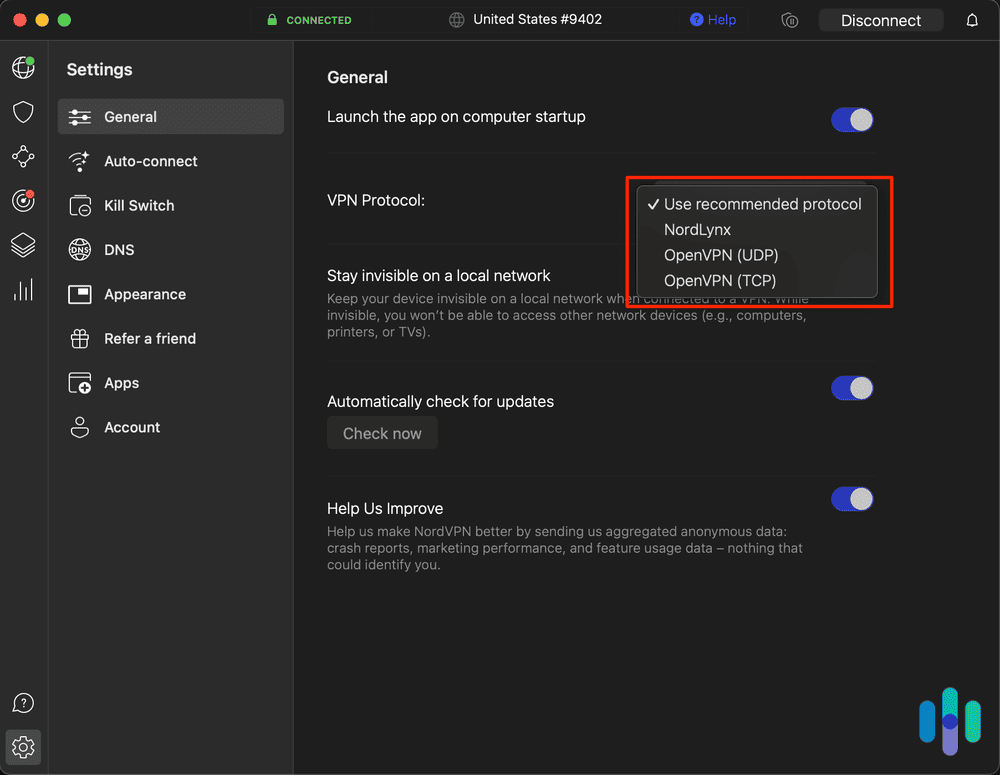
How a company handles IP addresses is also important, because it impacts our likelihood of being tracked. It’s best if a company offers dynamic addresses that change each time we log on, making it even harder to track what we’re doing online. A static IP address stays the same every time we connect, which is only acceptable in certain situations, such as if you’re running a server.
Finally, we check that each VPN has a kill switch, which shuts down internet browsers in the unlikely event that a VPN disables. Our activity could become exposed if a kill switch isn’t in place, which kind of defeats the purpose of having one in the first place.
Speed
We typically test VPNs from our Brooklyn office, where we have a private Optimum network. On some occasions, however, we test VPNs when we travel.
Our internet speed without a VPN serves as a control. We know our readers use all sorts of devices, and we want to make sure we have everyone covered. That’s why we test on both Mac and Windows machines.
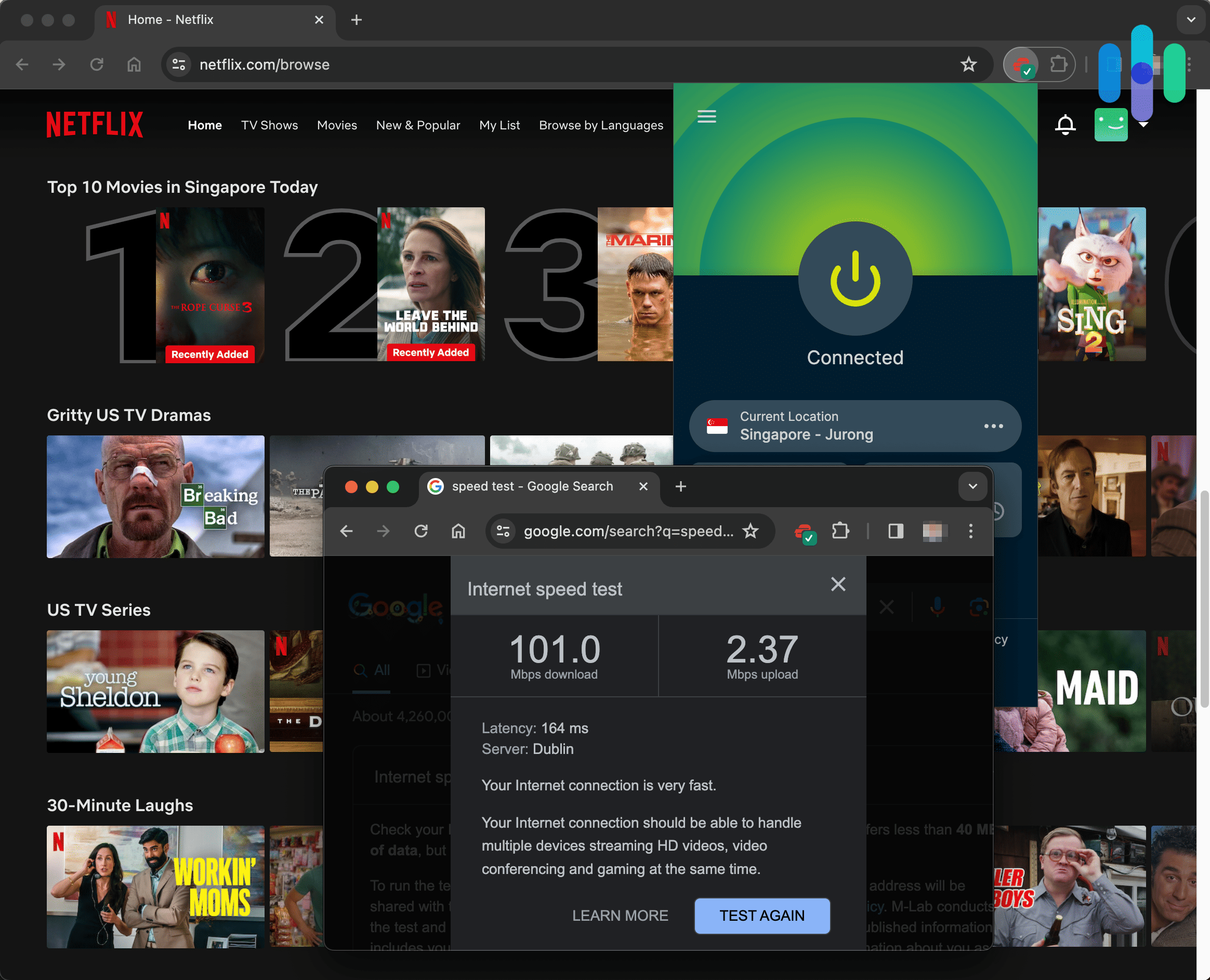
We use the website SpeedTest.net to test download speed, upload speed, and latency. We first perform tests with the VPN and then without. Download and upload speeds are measured in megabits per second, while latency is measured in milliseconds. Once we take those two measurements, we identify the percentage difference to account for any discrepancies between devices.
Factors such as distance from the server, operating system, and device type all have an impact on speed, but it’s ideal for VPNs to have no more than a 40 percent difference in any of the categories above.
FAQs About Brave VPNs
Still have questions about using a VPN on Brave? Don’t worry, we’ve got the answers to some of the most common ones below.
-
Will a VPN track my activity?
The short answer is no. The longer answer is bad ones will, good ones won’t. Always make sure to read your VPN provider’s log policy, and I’d recommend selecting one that has verified the policy through recent third-party audits.
-
Do I need to use a VPN browser extension?
A VPN browser extension is a bit of a misnomer, since there is no such thing. If you’re using a browser extension provided by a VPN service, what you’re really using is a proxy server — a middle-man that hides your true IP address. That can increase your anonymity online, but it won’t encrypt your data, which is one of the main reasons you want to use a VPN in the first place.
-
How much does a VPN cost?
Even the best VPNs are relatively inexpensive. Expect to pay between $3 and $15 per month, depending on the service you select and the duration of your subscription.
-
Are there any good free VPNs?
Yes, Proton VPN’s free version is one of the best in 2025. It offers unlimited data, strong privacy and security, fast speeds, and a Brave extension. However, many other free VPNs are risky to use, as they might log and sell your data.
-
Are VPNs legal?
Yes, VPNs are legal in most countries, except extremely oppressive ones like China, North Korea, and Iraq. What you do with your VPN, though, can get you into trouble. They aren’t get-out-of-jail-free cards.


